- Home
- John Jakes
The Seekers Page 16
The Seekers Read online
Page 16
Full. Elizabeth hadn’t milked her again.
Well, he’d have to do it when the rain let up.
More and more often this spring, Elizabeth seemed to be forgetting or ignoring important work. He never spoke of it, adding the burden to his other ones in the silent hope that doing so might make his wife less weary and somber. It never seemed to. Yet Abraham refused to give up the effort to lighten her load. At the same time, the lapses troubled him.
He returned to retrieve his rifle, horn, pouch—and, by the tail, the squirrel. He slopped through the mud at the front of the cabin. From several feet away, he saw the thick plank door standing slightly ajar. The thong that raised the inside latch dangled from the small hole.
He always insisted Elizabeth keep the door barred and the latchstring in, even when he was near the cabin. She refused, claiming the cabin was confining enough as it was. She shrugged off his statements that women had been murdered by stealthy Indians while their husbands worked only a short distance away.
As he reached the door, he heard one-year-old Jared Adam bawling. His scalp prickled with a belated realization. Elizabeth should have come to the door when she heard the shot.
Fearful, he jerked the cabin door open as the blackening sky rumbled.
ii
Abraham stepped out of the downpour, held up his prize. “I picked off a squirrel for—”
His face froze in surprise.
Not one of the three tallow candles in tin wall sconces had been lit. The cabin was dark except for the flickering logs in the hearth.
Above the logs the family stew pot hung from a pole mounted across the inside of the chimney. A burned stench drifted from the pot. Elizabeth had been cooking corn meal into mush. All the water had boiled away.
There was an oppressive stillness. It was broken only by the rattle of rain on the hand-riven roof clapboards. By the tick of Chief’s undipped nails on the puncheon floor. And by Jared Adam’s fretful crying, off to Abraham’s right where the firelight failed to reach.
He saw his wife clearly enough. Her back bowed, she sat on one of their two block chairs—sixteen-inch hickory logs standing on end. Her hands were fisted on the knees of her soiled dress. Her blue eyes stared into and through the fire.
Angry, Abraham flung the squirrel on the puncheon table projecting from one wall. The squirrel struck so hard, the table’s pole legs quivered. The dead animal’s head stained the wood. He never noticed.
“Elizabeth.”
No answer.
“Elizabeth, the baby’s crying. Don’t you hear him?”
An eternity seemed to pass before she turned her head. Tears shone on her cheeks.
He dropped his pouch and horn, laid his rifle beside the squirrel, rushed to her as the baby howled all the louder. His rage left him in an instant, replaced by grief. He gripped Elizabeth’s shoulders, felt them trembling, whispered, “What’s wrong?”
Her voice was feeble. “I—I don’t know. I sat down—I’m so tired, Abraham. I felt so miserable all at once and—I don’t know,” she repeated in a futile tone.
Her face had a distinct pallor. She had lost weight over the past months. The bosom of her dress looked almost flat because her breasts sagged.
“Elizabeth, you’re not carrying a child again, and haven’t told me—?”
She shook her head. The fair hair that once had glowed so brilliantly was seldom washed these days; it hung dull and tangly at her shoulders. She began to rock back and forth.
“I don’t know what’s wrong, except I hate this place. I hate it. Oh God, I hate it—”
Sobbing, she covered her face and turned her back on him. Unseen in the darkness, the infant still made his presence known with his damnable howling. Abraham came close to cursing him.
Struggling to keep his voice calm, he said, “I brought in a squirrel. Elizabeth, do you hear?”
She gave no sign.
“I thought a squirrel pie might be a welcome change. I’ll fix it—”
“I’m not hungry.”
“You’ve eaten next to nothing all week!”
“I don’t know why,” she said. “I don’t know.”
Terrified by her glazed eyes but not knowing exactly what to do, Abraham gripped her shoulders again, tried to lift her from the block chair. “Let me put you in bed. I’ll see to the boy—”
She offered no resistance. He guided her to the double bedstead in the angle of two walls. The bed’s outer corner was supported by a pole similar to those beneath the table, but thicker. He lowered Elizabeth gently to the double deerhide spread over a thick matting of corn husks. Despite the padding, the bed was as hard as anything he’d ever slept on, the earth included.
Elizabeth started shivering. He covered her with one of their few luxuries—a handmade Kentucky quilt in the simple yet beautiful Star of Bethlehem pattern.
In a moment or two, her shivering stopped. Abraham knelt. He suspected the chill and misery were products of her mind, not her body. He kissed her wind-roughened cheek. “Don’t fret, I’ll have the baby quiet soon. Don’t worry about a thing—”
She began to cry again. “I don’t know what’s wrong with me, Abraham. I knew the corn meal was burning. I could smell it. I sat there and didn’t care—”
“There’s nothing wrong with you except lack of rest,” he said. Neither of them believed it.
“No, Abraham, it’s something else. I’m not strong enough for you. For this—”
“My God, don’t say that! You’ve done so much work—”
“But I hate it. I despise it. Sometimes I just don’t want to go on—”
She controlled her crying, wiped her eyes, looked at him and spoke more lucidly. “You’ve never heard much about my father, have you?”
“Only the talk at home. What has he to do with us?”
“He has a great deal to do with me, I think.”
“What do you mean?”
“Mama told me more about him than she ever told anyone else, including your father. He was—a peculiar man. Wild and—and brave in some ways. But weak in others. He ran from whatever he disliked. Or drank to forget it. Perhaps—no, listen to me, Abraham, you must hear this—perhaps his nature was strength and weakness in one. Mama calls it the Fletcher blood.”
“I’ve never heard her mention—”
“Fletcher blood. I have it. I know it’s one reason I resented your father so, and insisted we come to this place.”
“Don’t forget that took courage, Elizabeth. Great courage.”
The moment he said it, his mind showed him an image of Daniel Clapper. He heard Clapper speaking of why men fled toward another horizon, then another, another—
“I don’t have any courage left,” she said. “Two years out here and—any that I may have had—it’s gone. All I feel is hate. Tiredness, and hate—”
Her hand closed on his, an iced claw. “I know what I am—”
“Stop.”
“I don’t want it to hurt you—”
“Elizabeth, don’t—”
“Most of all I don’t want it to hurt baby Jared.”
A long silence. Then: “How could it?”
“He has the same blood, doesn’t he?”
Abraham felt a terror so deep and devastating that he couldn’t speak for several moments. The child’s howls dinned in the confined space, ceasing only when, the baby gulped a breath. He tried to ignore the squalling, tried to quell the fear Elizabeth’s strange ramblings generated. He soothed her forehead with a palm, and lied. “You’re feverish. You need rest.”
She stared up into the darkness where the timbers of the loft floor were barely visible. He tucked the quilt around her throat and shoulders. “I’ll pile an extra log or two on the fire—it promises to be a foul night. Maybe you’ll feel like eating something in a few hours—”
She closed her eyes. Tears ran down her cheeks as if she were in great pain.
“See to the baby,” she whispered. “See to the poor baby.”<
br />
She rolled onto her side, away from him. He covered his eyes, wondering if what she’d rambled about was true. Did some streak of inherited temperament drive her to these despairs that grew deeper and more frequent as the weeks passed?
Or was it the land? Some weren’t strong enough to win the struggle with the land. Was she one of those—?
Forcing himself to activity, he placed two smaller logs atop the others, then walked across the cabin as flames leaped up beneath the stinking pot of burned mush. Jared Adam kept shrieking.
Abraham reached down for the bundled boy, raised him to his shoulder, felt the sopping wetness of the coverlet in which Elizabeth had wrapped him.
“Papa’s here,” Abraham whispered. “It’s all right, Jared. Papa’s here.”
The infant cried less stridently. Chief ticktacked across the floor to the cradle Abraham had hollowed from half a gum log and finished with crescent rockers pegged to the ends. The bulldog sniffed the aroma of urine permeating the crib, lumbered back to the corner where he always slept. Outside, Henrietta Knox lowed loudly, her bell clanking.
Abraham started for the trunk to find clean rags for the baby. After he’d discarded the soiled ones, he wrapped Jared carefully, then went back to the trunk for a dry coverlet. As he picked Jared up again, he glanced at the bedstead. Elizabeth lay motionless under the quilt. Her eyes were shut but he didn’t believe she was asleep.
All at once he couldn’t tolerate the ripe smells poisoning the air in the cabin. In spite of the downpour, he jerked the latchstring, stepped into the open doorway—
My God, how dark it was! And not even nightfall yet.
Gusts of wind blew cool rain in his face. He covered Jared’s head hastily.
He pondered what his wife had said about the Fletcher blood. Despite a death some called heroic, Fletcher had been a tainted man. There was certainly mounting evidence of a similar taint on Elizabeth—
Had it passed to the baby boy on his shoulder? Unconsciously, he tugged up the blanket, all but hiding the dark-fuzzed skull.
Westward, the clouds had lowered. The western ridge had disappeared in the murk. The small amount of daylight remaining showed Abraham the damaging effects of the flash storm. All his checkrows were washed away. The rain had cut new channels in the ground. He would have to start again. The plowing, the seeding—everything.
With his wife lying silent behind him and Jared fretting on his shoulder, Abraham stared at the storm-raked field and almost shook with rage.
What an accursed land! It treated a man’s hopes and a man’s labors and a man’s loved ones with inhuman indifference—
He stood there for almost half an hour, looking at the rain but seeing his mortal enemy.
Chapter II
Old Ghosts and New Beginnings
i
ONE AUTUMN SATURDAY A year later, Abraham walked back from Clapper’s store to find the farm unexpectedly quiet.
He stopped at the edge of the property, frowning as he scanned it. His eye drifted from the cabin to the small barn built in the spring with the help of neighbors. Henrietta Knox grazed near the barn. From within came the mournful bellow of the ox he’d bought using money Daniel Clapper loaned him. He was deeper in debt than ever before.
His gaze moved on to the cultivated ground—eight acres now, the corn already standing in shocks that cast long shadows in the cool amber sunlight of late afternoon. In addition to the corn, he’d put in patches of turnips, which had done well, and watermelons, which hadn’t.
He quickly shook off the lethargy induced by a generous amount of Clapper’s whiskey. Elizabeth had planned to make soap today. The process took hours. She boiled wood-ash lye and fat which she’d saved, producing harsh, slimy lumps of soap that seemed to remove more skin than dirt. But Abraham saw no smoke rising from the chimney into the flurry of leaves whirled across the roof by the wind.
No smoke—nor any sign of activity in or around the cabin. He didn’t see Elizabeth or their two-year-old son anywhere.
He put down the jug of New Orleans molasses he’d obtained at Clapper’s. Packet boats brought the sweetening up the Mississippi and the Ohio regularly now. He’d lacked the exact change for the purchase, so the storekeeper had snipped another piece from one of his few paper dollars.
A second close scrutiny of the property produced no evidence of trespassers. But just in case, he made sure his Kentucky rifle was loaded and ready to fire.
“Elizabeth? Jared?” His voice boomed back at him in the stiff wind—Elizabeth? Jared?—unanswered. Henrietta Knox turned her head briefly, then resumed chewing the brown grass.
Moving slowly toward the cabin, he saw Elizabeth’s splint broom lying abandoned in the dooryard. Damn! She was supposed to stay locked inside while he was gone.
Again he called her name. Again no answer. He prodded the cabin door open with the muzzle of his rifle.
He saw nothing but darkness. Not a single tallow-dip was lit against the coming dusk. The river murmured in the distance.
It was the letter, he decided. The damned, hurtful letter from his father. A pack train had delivered it to Fort Hamilton thirty days ago—
During the past twelve months the elder Kent’s letters had changed noticeably. The tone grew steadily less cheerful, and items of interest concerning the east and Europe had become more and more sparse. The last bit of information Abraham could recall his father reporting with genuine enthusiasm was months old. Philip Kent’s boyhood friend, Lafayette, had finally been released from prison in Austria and allowed to return to France. There, living in relative seclusion, he had resumed correspondence with his old comrade in Boston.
Of late, however, Abraham found himself relying almost totally on other settlers for news—
News of President Adams’ refusal to go to war with France, for instance. Adams resisted war even though many in his political party—including Philip, presumably—favored it.
There were new developments in France. By means of a coup, a military leader had seized power. The soldier named Bonaparte was a man of vast ambition, it was said. As first consul of his country, he announced his intention to deal with the United States in an amicable way—no doubt to prevent an American alliance with France’s traditional enemy, Britain.
Bonaparte’s avowed friendship might end the hostilities between American and French naval forces. People in the east were suspicious of the new ruler, though. Didn’t he openly express his dream of a worldwide French empire? Might he not press the Spanish to recede the vast Louisiana territory—including the port of New Orleans—in return for France’s surrender of portions of Italy? The anti-French faction east of the mountains claimed such negotiations were in fact under way in secret. Ultimately, Bonaparte could endanger the use of the Ohio and Mississippi as commercial routes for the western part of the country.
Philip hardly touched on these matters. Abraham heard about them from men gathered around Clapper’s cracker barrel. When the recent, extremely brief letter arrived via pack train, Abraham at last understood his father’s silence on more general subjects.
Philip wrote that in late February of this year, 1800, Peggy Ashford McLean Kent had died of a wasting disease that shriveled her body and tortured her senses for six months before death gave her release. Since reading the letter, Elizabeth had lost her appetite, gone listlessly about her chores, paid little attention to Jared and less to her husband.
They still slept side by side. But Abraham hadn’t touched her in a month, sensing her unspoken wish that he refrain. As a result, he often felt angry with her. His anger found an outlet in Saturday visits to the settlement. She seldom felt strong enough to walk with him. He usually came home more than a little drunk—
“Elizabeth!”
This time he shouted. The echo rolled away through the trees and died under the murmur of the wind. Invisible in the brush that screened part of the riverbank, someone answered.
“Papa?”
Exhaling loudly, Abrah
am hurried forward. “Jared, you stay right there—”
What in hell was the child doing outside, unattended?
Abraham clambered noisily down through the brush. He heard Chief’s feeble bark. The bulldog was ancient now, barely able to walk.
Once more Abraham searched the woods and the portion of the riverbank visible to him. Still no sign of Elizabeth. Fear turned to wrath again as he parted a screen of low branches and discovered his son.
Moccasins off and feet dirty, Jared was seated on the ground, alternately scooping dirt from a hole and building it into a small mound. The boy looked up with bright blue eyes—the Fletcher eyes he’d inherited from his mother. Chief, lying a few feet away, lolled his tongue but made no effort to rise and greet his master.
Jared’s tawny hair hung matted over his neck. His hide shirt showed rips at the elbows—more indications of Elizabeth’s neglect. Almost fearfully, the boy continued to stare up at his stocky father.
“Why did Mama leave you alone, Jared?”
Although Jared was only two, Elizabeth had been able to teach him to use rudimentary sentences. He answered with one. “Don’t know.”
“Where did she go?”
The boy looked away. “Down there.” A grimy hand pointed.
Abraham scowled. “The river? Whatever for?”
“Don’t know. She said to play. Then she left.” As if to show that he’d tried to do as he was told, he glanced down at the mound of dirt.
Abraham started to say something. A faint sound from the bushes behind Chief brought his head snapping around. His hand turned cold on the stock of his rifle.
Eyes fixed on the brush concealing the source of the rattle, he said, “Jared; listen. Get up. Come to me.”
Jared frowned. “Want to finish—”
“I said come to me!”
Abraham’s palms were slick with sweat. He dared not look away from the brush for an instant—
Tears appeared in Jared’s eyes. But he rose obediently and walked to his father—moments before the head of the snake jutted from the underbrush.
“Get behind me, Jared!”

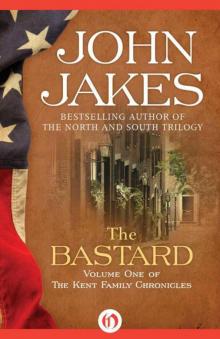 The Bastard
The Bastard The Furies
The Furies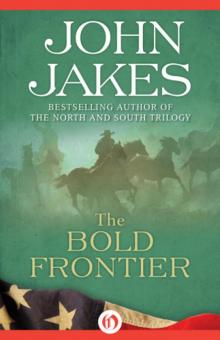 The Bold Frontier
The Bold Frontier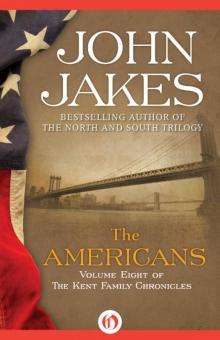 The Americans
The Americans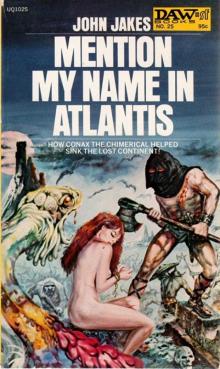 Mention My Name in Atlantis
Mention My Name in Atlantis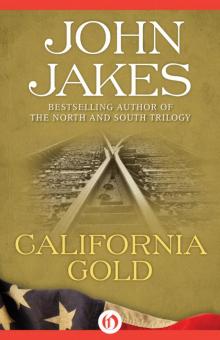 California Gold
California Gold North and South
North and South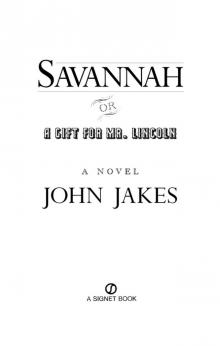 Savannah, or a Gift for Mr. Lincoln
Savannah, or a Gift for Mr. Lincoln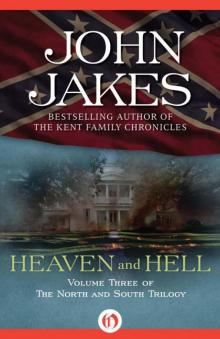 Heaven and Hell
Heaven and Hell Homeland
Homeland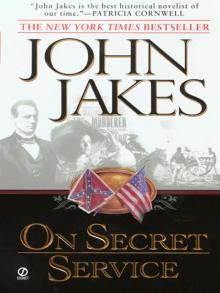 On Secret Service
On Secret Service The Lawless
The Lawless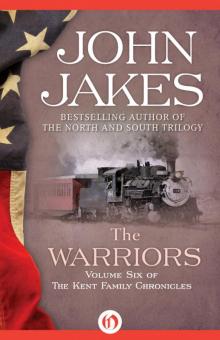 The Titans
The Titans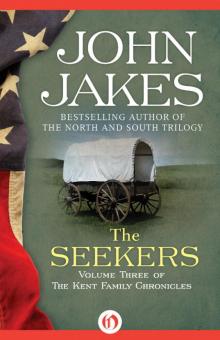 The Seekers
The Seekers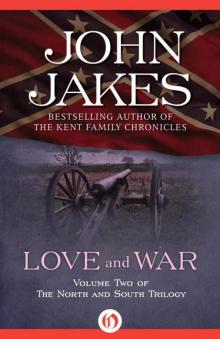 Love and War
Love and War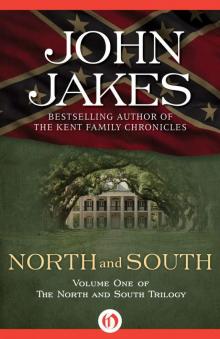 North and South: The North and South Trilogy (Book One)
North and South: The North and South Trilogy (Book One)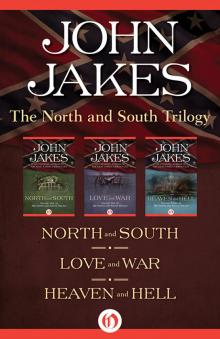 North and South Trilogy
North and South Trilogy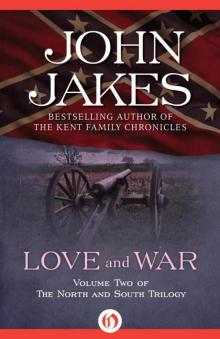 Love and War: The North and South Trilogy
Love and War: The North and South Trilogy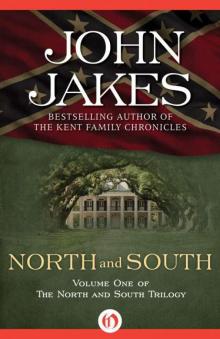 North and South: The North and South Trilogy
North and South: The North and South Trilogy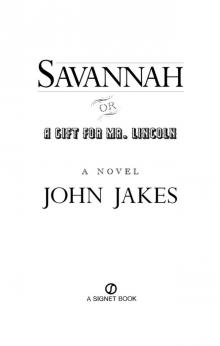 Savannah
Savannah Lawless
Lawless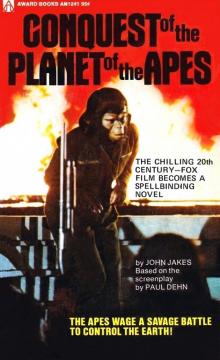 Conquest Of The Planet Of The Apes
Conquest Of The Planet Of The Apes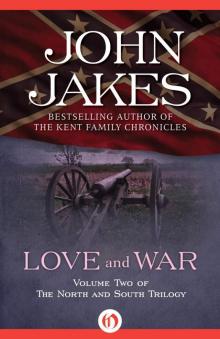 Love and War: The North and South Trilogy (Book Two)
Love and War: The North and South Trilogy (Book Two) The Rebels: The Kent Family Chronicles
The Rebels: The Kent Family Chronicles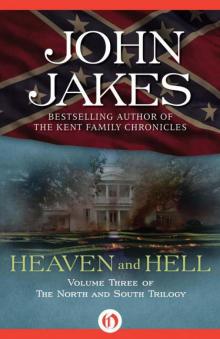 Heaven and Hell: The North and South Trilogy
Heaven and Hell: The North and South Trilogy Planet of the Apes Omnibus 2
Planet of the Apes Omnibus 2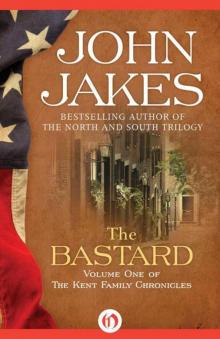 The Bastard: The Kent Family Chronicles
The Bastard: The Kent Family Chronicles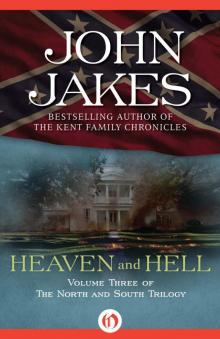 Heaven and Hell: The North and South Trilogy (Book Three)
Heaven and Hell: The North and South Trilogy (Book Three)